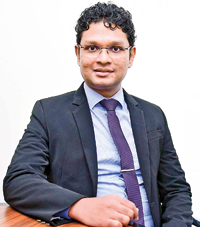From Waste to Wonder: Faculty of Humanities and Sciences of SLIIT promotes Environmental Stewardship through Resourceful Research
View(s): In a remarkable achievement, two second-year Biotechnology students, Mr. Amavin Mendis and Ms. Geethma Ekanayake, from the Faculty of Humanities and Sciences at SLIIT, have successfully published their research in the prestigious journal “Molecules.” Their paper titled “Fabrication of Naturally Derived Chitosan and Ilmenite Sand-Based TiO2/Fe2O3/Fe-N-Doped Graphitic Carbon Composite for Photocatalytic Degradation of Methylene Blue under Sunlight” has garnered attention for its significant contribution to sustainable solutions.
In a remarkable achievement, two second-year Biotechnology students, Mr. Amavin Mendis and Ms. Geethma Ekanayake, from the Faculty of Humanities and Sciences at SLIIT, have successfully published their research in the prestigious journal “Molecules.” Their paper titled “Fabrication of Naturally Derived Chitosan and Ilmenite Sand-Based TiO2/Fe2O3/Fe-N-Doped Graphitic Carbon Composite for Photocatalytic Degradation of Methylene Blue under Sunlight” has garnered attention for its significant contribution to sustainable solutions. The publication in “Molecules,” with an Impact Factor of 4.927, solidifies the importance of the students’ research. The journal holds a remarkable ranking as a Q1 journal, occupying the top 25% in its subject area, and carries an h-index of 171. Being indexed in Scopus as Q1 in the top 83% of articles further emphasises the significance of this research publication. This publication was led by Dr. Charitha Thambiliyagodage (supervisor), Heshan Liyanaarachchi, and Madara Jayanetti.
The publication in “Molecules,” with an Impact Factor of 4.927, solidifies the importance of the students’ research. The journal holds a remarkable ranking as a Q1 journal, occupying the top 25% in its subject area, and carries an h-index of 171. Being indexed in Scopus as Q1 in the top 83% of articles further emphasises the significance of this research publication. This publication was led by Dr. Charitha Thambiliyagodage (supervisor), Heshan Liyanaarachchi, and Madara Jayanetti.
In an interview with the authors of the journal article, Mr. Amavin Mendis and Ms. Geethma Ekanayake, they discussed the specialty and significance of their achievement.
Congratulations on your
publication. Could you all
elaborate on the research?
We were able to fabricate a novel photocatalyst from ilmenite sand derived metal oxides and shrimp shell derived chitosan. This nanocomposite was capable of degrading the textile dye, methylene blue under the presence of natural sunlight. The metal oxide was synthesized in the lab by acid digestion of naturally occurring ilmenite from Pulmudai, Sri Lanka. Chitosan was derived from waste shrimp shells obtained from a seafood processing factory. In the lab, the nanocomposite was produced via hydrothermally followed by pyrolysis. This treatment resulted in the formation of metal oxide nanoparticles on a nitrogen-doped graphitic carbon framework. The nanoparticles were able to absorb solar energy and produce reactive radicals which can break the bonds in the dye and produce simpler molecules that are not harmful. The photocatalyst could be continuously used in several cycles after washing with water.
What’s the specialty of this
achievement?
Sri Lanka is a developing nation, and with this development, there are certain undesirable outcomes such as pollution. This pollution takes many forms. Our research was focused on the purification of wastewater, especially industrial effluents with textile dyes. We identified this to be a major hazard to humans as well as the surrounding environment affecting both flora and fauna. We tried to address this problem through nanotechnology by incorporating and modifying already abundant raw materials to overcome this hazard.
How did you achieve such a significant achievement, and what was the
support you got from SLIIT?
We were able to create this nanocomposite in our fully equipped laboratory at the faculty of humanities and sciences and conduct all photocatalytic experiments on-site. SLIIT has created an academic atmosphere where students can learn and join the esteemed panel of lecturers to conduct cutting-edge research in many fields including material science and nanotechnology, equipping students with the skills and experience to enter the current competitive world with confidence and knowledge. We would also like to thank the world bank for providing grants under the AHEAD operations in order to conduct this research.
Dr. Malitha Wijesundara, Dean of the Faculty of Humanities and Sciences, emphasised the importance of such research endeavours for SLIIT and the students’ futures. He stated, “This publication reflects the exceptional talent and dedication of our students. By conducting cutting-edge research and exploring sustainable solutions, they not only contribute to the scientific community but also gain invaluable skills and experiences that will shape their future careers.”
Supervisor Dr. Charitha Thambiliyagodage highlighted the significance of the developed nanocomposite, showcasing the potential of utilising naturally derived materials in photocatalysis. He stated that “This achievement solidifies the position of the Faculty of Humanities and Sciences as a leading player in scientific research, and it reflects collaboration, dedication, and the potential for sustainable breakthroughs in creating a better society.
The Faculty and SLIIT take great pride in the accomplishments of its students and acknowledge the positive impact their research has on both their futures and society as a whole. As SLIIT continues to nurture scientific innovation and foster sustainability, this publication stands as a testament to the potential for transformative research in addressing global challenges and shaping a brighter future.
HitAd.lk is the best and biggest mobile phone market in Sri Lanka, and we guarantee you will find what you need here from our extensive listing of mobile phones for sale in Sri Lanka. Whether it’s a budget-priced smartphone for communication, or higher end features with advanced connectivity, there are many different options from which to choose from on our site!


